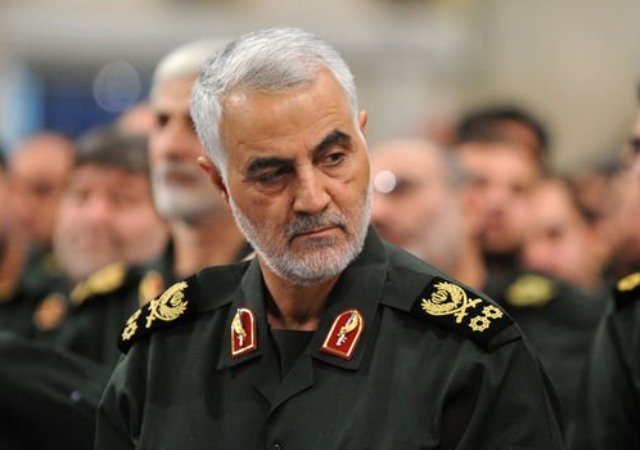A US airstrike killed Iranian General Qassem Soleimani on Friday, sparking anger and calls for revenge, but could the attack spark World War 111?
Iranian General Qassem Soleimani was killed on Friday in a US drone airstrike in Baghdad.
Soleiman was commander of Iran’s elite Quds and a driving force in its growing military influence in the Middle East.
The death of Soleiman – who was considered the second most powerful figure in Iran – has sparked anger and fears of retaliation.
Soleiman had been leaving Baghdad International Airport in a convoy of two cars when missiles from the US airstrike hit.
The US Defence Department said Gen Soleimani was targeted because he was “actively developing plans to attack American diplomats and service members” in the region.
Also killed were Iraqi militia commander Abu Mahdi al-Muhandis and reportedly three others.
Now Iran’s Supreme Leader Ayatollah Ali Khamenei has said harsh revenge awaits the “criminals” who killed Soleimani.
He said Soleimani’s death, though bitter, would double the motivation of the resistance against the United States and Israel.
In a statement shown by state television, he called for three days of national mourning.
Around the globe, there are calls for de-escalation with Foreign Secretary Dominic Raab saying: “We have always recognised the aggressive threat posed by the Iranian Quds force led by Qasem Soleimani.
“Following his death, we urge all parties to de-escalate. Further conflict is in none of our interests.”
United Arab Emirates Minister of State for Foreign Affairs Anwar Gargash echoed Mr Raab’s sentiment and said wisdom and political solutions must prevail over confrontation and escalation, in comments published on Twitter on Friday.
However, retaliation from Iran against the US is a concern, with Tory MP Tobias Ellwood, a former defence minister who served as a captain in the Army, tweeting “this is big”, adding: “Expect repercussions.”
Former Middle East minister Alistair Burt told BBC Radio 4’s Today programme that the airstrike was “extremely serious” and could cause “a huge potential escalation”.
Mr Burt, who stood down as a Tory MP at the last election, emphasised it is “very important now to concentrate on what happens next, and for everybody involved diplomatically to do everything they can to try and diffuse the situation”.
Asked whether this airstrike was an unwise move by the United States, Mr Burt said it “takes the confrontation between the United States and Iran to a completely different level”.
He said: “It is the killing of a very senior political as well as military commander.”
Mr Burt added: “Any action where you cannot foresee immediate consequences, take steps to prevent the most difficult consequences, you know, puts the region on edge and makes life more difficult for everyone.
“It’s very hard to see what the consequences will be.
“I’m quite sure the United States will have to come out with more justification for its actions – what has caused this.
“But I think everyone has got to have extremely cool heads this morning.
“This is a very grave escalation in the affairs of the region, the consequences are unknowable and I think words and comments have got to be extremely carefully handled today.”
Reactions to the death
While some in the US are praising US President Donald Trump for the death of Soleiman, others are condemning the action for escalating already fraught tensions.
Democrat Joe Biden, who is hoping to face off against Mr Trump in November’s Presidential election, has accused him of having “tossed a stick of dynamite into a tinderbox”, and feared the US could be sucked into a “major conflict” – inevitably raising the prospect of UK, as a close ally of the US, likewise getting involved.
US Senator Bernie Sanders released a statement saying: “Trump’s dangerous escalation brings us closer to another disastrous war in the Middle East that could cost countless lives and trillions more dollars.”
The Foreign Office has advised British-Iranian dual nationals against all travel to Iran and for other British nationals to seek the department’s advice before travelling to the nation.
They warn British nationals risk being arbitrarily detained or arrested by Tehran.
Former US national security adviser John Bolton has welcomed the killing of Qassem Soleimani and said he hoped to would be “the first step to regime change in Tehran.”
He tweeted: “Congratulations to all involved in eliminating Qassem Soleimani.
“Long in the making, this was a decisive blow against Iran’s malign Quds Force activities worldwide.
“Hope this is the first step to regime change in Tehran.”
The UN special rapporteur on extrajudicial killing said the targeted airstrikes on Qassem Soleimani and Abu Mahdi al-Muhandis violated international human rights law.
Agnès Callamard said the US would need to prove Iran’s top general and his Iraqi paramilitary adviser constituted an imminent threat to others.
She said: “An individual’s past involvement in ‘terrorist’ attacks is not sufficient to make his targeting for killing lawful.
“The White House statement fails to mention the other individuals killed alongside Soleiman. Collateral? Probably. Unlawful? Absolutely.”
Labour leader Jeremy Corbyn has told the Government to stand up to the “belligerent actions and rhetoric” from the US after the nation killed Iran’s top general.
In a statement, Mr Corbyn said: “The US assassination of Iranian general Qassem Soleimani is an extremely serious and dangerous escalation of conflict in the Middle East with global significance.
“The UK Government should urge restraint on the part of both Iran and the US, and stand up to the belligerent actions and rhetoric coming from the United States.
“All countries in the region and beyond should seek to ratchet down the tensions to avoid deepening conflict, which can only bring further misery to the region, 17 years on from the disastrous invasion of Iraq.”
The head of the Iranian-backed Lebanese militant group Hezbollah has called for the death of Gen Soleimani to be avenged.
Hassan Nasrallah said: “Meting out the appropriate punishment to these criminal assassins will be the responsibility and task of all resistance fighters worldwide.
“We will carry a flag on all battlefields and all fronts and we will step up the victories of the axis of resistance with the blessing of his pure blood.”
Foreign Secretary Dominic Raab has called for a calming of tensions from all aggressors.
Mr Raab issued a statement saying the Government had “always recognised the aggressive threat posed by the Iranian Quds force led” by the general.
He said: “Following his death, we urge all parties to de-escalate. Further conflict is in none of our interests.”
Hezbollah rallies axis of resistance for vengeance
The leader of Lebanon’s Hezbollah group Hezbollah called on ‘resistance fighters’ around the world to avenge death of Soleimani
The “axis of resistance” is a term that refers to an alliance formed by Iran, Syria and Hezbollah to fight against Israel and the Western military presence in the region.
The heavily armed Hezbollah group controls whole neighbourhoods in Beirut and most of the south of Lebanon, including the area bordering Israel.
It also has fighters deployed in Syria and Iraq who were operating under Soleimani’s command.
“Meting out the appropriate punishment to these criminal assassins… will be the responsibility and task of all resistance fighters worldwide,” Hassan Nasrallah said in a statement.
“We who stayed by his side will follow in his footsteps and strive day and night to accomplish his goals,” the leader of the powerful Shia militant group said.
“We will carry a flag on all battlefields and all fronts and we will step up the victories of the axis of resistance with the blessing of his pure blood,” Nasrallah said.
It would be recalled that World War I and II took place in the first half of the 20th century and involved most parts of the world and cause large scale destruction, death and displacement. An estimated 22 million people lost their lives in the WWI while WWII recorded deaths of an estimated 70-85 million people, i.e, nearly three percent of the population. Apart from war, wor-borne diseases and famines as well as the ensuing economic slowdown and loss of livelihoods led to severe civilian casualties.
WWII ended with the US military forces dropping the atom bomb on Japan’s Hiroshima and Nagasaki in 1945, instantly wiping out the cities. The damage from the bombs continues to surface in babies born with genetic mutations caused by the harmful radiation of the bombing. With the current weapons of mass destruction available to most governments today as well as superior nuclear technology, a World War III could potentially cause the end of the world as it is known.
Express, news18.com






















































